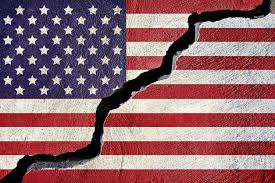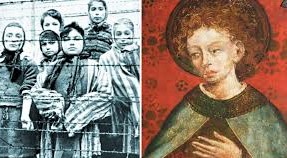
A Collective Yawn?
I recall as a child riding in our car’s back seat with my father’s Aunt Josie, a usually kind and gentle woman who visited us occasionally. As we passed a church, she asked, “What kind of church is that?” My father responded, “Protestant,” at which she made a face of disapproval because it wasn’t Catholic.
Though we’ve a way to go, religions have come a long way toward eliminating sectarianism and embracing ecumenism. For many years, major American religions, at least, have lived in peace, supporting one another in every way that doesn’t negate our differences.
Unfortunately, we can’t say that about American politics nor their adherents who engage in the culture wars. I can’t remember a time when we were more polarized as a nation.
Not About Doctrine
That’s not to say that religion has been unaffected. It’s just that the differences, between evangelicals on one side, for instance, and mainline Protestants and Catholics on the other, aren’t now about doctrine or religious teachings but about the kind of society we want and need.
(Many Catholics disagree with their mainline Protestant brothers and sisters on some issues, of course, including abortion and end-of-life issues.)
What I see as the most serious issue is that so many on all religious sides appear to take their religious convictions much less seriously than their political or cultural positions.
We fail, says an article in a recent issue of the National Catholic Reporter, entitled “Are We All in This Together?” “to see the value and worth of a Uyghur facing persecution in China, a student threatened by gun violence in their own school, a person with cancer trying to navigate our health-care system to get proper treatment without going bankrupt, an unborn child in the womb of a poor, single mother or a migrant fleeing gang violence in Central America.”
Recognize Everyone’s Worth
People taking the gospel seriously, continues the article, would determine to recognize everyone’s worth and do what it takes to help solve their problems and protect their lives and dignity.
“But many in our culture, including most Catholics, place their political ideology or partisan allegiance above such principles – or any separate principles at all,” says the article.
It’s hard to disagree with these sentiments, in my view, leading to the question, “When did our political and partisan allegiance become so important and our religious convictions become so irrelevant?”
Why are statements from religious leaders, including Pope Francis, on the subjects of immigration, protection of the environment, treatment of the poor and protection of the unborn met with a collective yawn?
And why does the Bible, to which we give such consistent lip service, have such little impact on our lives?
Just Like Yourselves
The prophet Ezekiel, no liberal, Marxist voice for sure, in his instructions on how land should be divided insisted that “the resident aliens who have made their homes among you and now have children” be included. “Treat them as if they were born there, just like yourselves.”
And Jesus’ words about treatment of others are the heart of the gospel: “I was hungry and you gave me food,” etc.
I believe my great aunt Josie, if living today, would feel love and solidarity for people of other faiths and would take seriously the teaching of the Bible and her church regarding treatment of others. Since her time, most churches have awakened to the needs and dignity of all. Unfortunately, many of their members have not.




